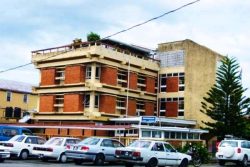Residents of Nappi and surrounding communities have complained of police harassment saying that police put up roadblocks at night, threaten them and demand bribes but despite complaints, the practice has not ceased.
“What police do is they come to catch a raise on the road,” Guy Fredericks, the toshao of Nappi told Stabroek News recently. “That is all dem man does come on the road to do, harass you and get a raise,” he said. “It is going on right now.”
The village chief said he had spoken to the Officer-in-Charge of the Lethem Police Station about the incidents and the officer said he would speak to his ranks but the harassment still continues.
No senior police official could be contacted for comment yesterday.
For many persons in Nappi, 32.5 kilometres away from Lethem, motorcycles are the main means of transportation and often, residents would purchase these from Brazil. Fredericks said some of these motorcycles are not registered here but persons still ride these “hot bikes”. He said the police would go outside Lethem and between Nappi and Lethem, would stop persons traversing the road.
The toshao said that instead of the police taking away the motorcycles and charging the persons involved, they would demand money. He said some persons have paid off the police about five or six times.

Another government worker at Nappi, who asked to remain anonymous, said that some of the bikes are seized by the police and resold. She said her husband had spoken out about it in a recent incident and the policeman responded: “I does see you steady in Lethem, you gon know what I gon do to you.”
She related witnessing an incident where the police again stopped a resident and asked the rider to “set up something” but the woman with him began to raise her voice and the police did not restate their demand. “They are punishing the village,” she said.
“We know it is wrong to have the hot bikes but it is to fetch our load,” the resident said adding that the motorcycles are used to transport persons and their produce to and from their farms which can be long distances away. She said the police have said that they would go to Nappi to clean the community of the “hot bikes” but noted that many of the persons would have worked in Brazil to buy the bikes and could not afford one at the prices here, which are between $400,000 and $500,000 here. “Why are the policemen behaving in such a way that we cannot even be protected by them?” she asked. “Instead we have to run from them.” The resident added that the police are also targeting specific people.
In Parishara, a satellite community of Nappi, John Alfred related that oftentimes farmers from the community go to Lethem to sell their produce, spend the day and return in the evenings. He said most use motorcycles, some of which are registered but others are not. Alfred said the police travel about 10-15 miles outside Lethem and wait on the returning villagers. “Some of them are held up, some are taken back to the station with the motorbikes,” he said. He said the police demand bribes and “any amount they would call for.” He said it was not right as the police ought to charge persons with “hot bikes” but instead demand money. He also said that many hard-working people were affected. “They work hard for a living,” he said adding that the behaviour of the police was unfair.
Alfred said that when taking them back to the station, the police would ask the persons to walk with $50,000 to get back their bikes and this, he noted, was against the law as well. He said that just before Christmas police took away the documents of a resident returning to Nappi and up to last month, had not returned them.
Villagers identified one rank who they said was the main culprit. He has since been moved from the area but said other ranks are still continuing the practice of stopping persons and demanding bribes.
Alfred said the policeman was working in league with two young men from Lethem who would go to Parishara to sell drugs. Alfred, who is a rural constable, said he had approached the young men who said they were not selling drugs but if other youths wanted to join them, they could.
Alfred said there was a practice of persons taking motorcycles from Lethem and selling them. He said they learnt that the policeman and the young men hung out together after a motorcycle belonging to the policeman and one of the young men was stolen around Christmas time. He said that after speaking to them he was threatened.
He said that eventually the officer in charge at Lethem was contacted by the toshao. “The people who knew the story came too and everybody had to say something on what they know concerning these boys and the police,” he recounted.
He said there was another incident where the policeman and three young men met another resident on the road to Nappi and beat him up. “They met him on the road, beat him up and take away his motorcycle,” he said. According to Alfred, the young man said he gave up because one of the men beating him said that he was a policeman. He said village leaders again called the police but got no satisfactory answers. He said later, the motorbike was taken to the community and parked behind a house and one of the youths admitted that they had taken away the bike and told him where to find it.
Alfred said that on Christmas night, some policemen, including the officer, drove into the community and he confronted him. He said the officer was displeased and told him “you, I will catch you in Lethem”. He said the officer-in-charge at Lethem was informed and the policeman was seen leaving Lethem and up to mid-January, had not returned so residents assumed he had been transferred to another district.
Alfred said while that particular officer was no longer there, others are still stopping people and demanding money. He said after the meeting with the police, the village councillors were not satisfied as they thought more action would have been taken.
“We fear for the lives of our people who go to Lethem,” Alfred said. “We want security, we want safeguards for our people but up to now they can’t give us an answer,” he said. “We are looking for help. We cannot turn to the police because they are involved,” he added. “Our village council is willing to cooperate with them but not in that manner.”








